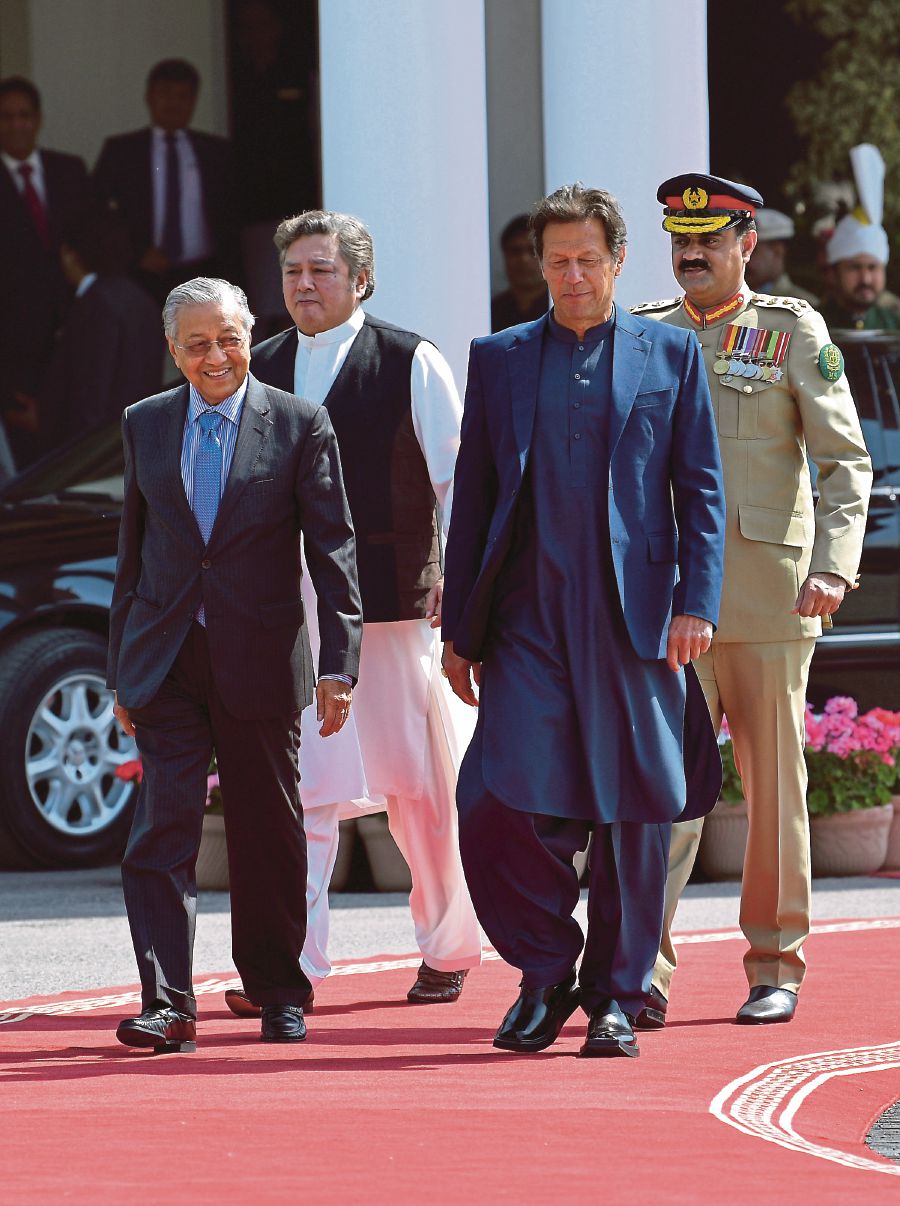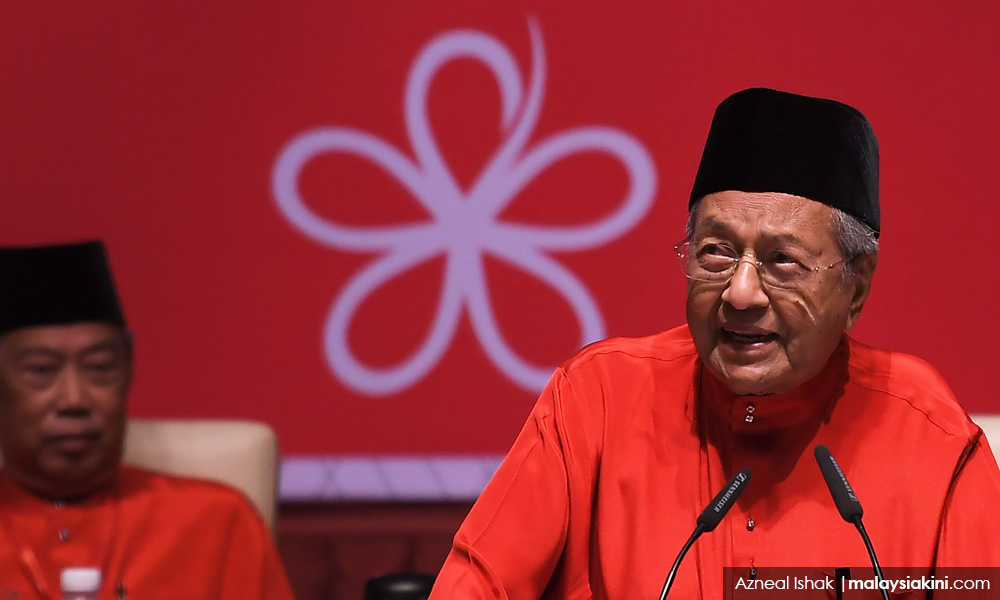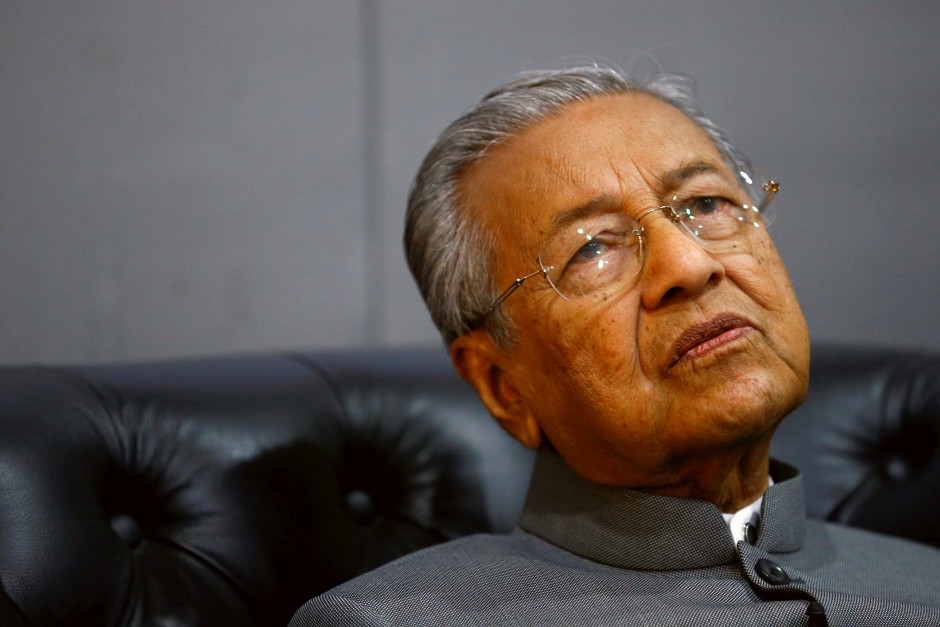
Published by New Straits Times & New Straits Times (Print), image from New Straits Times.
State visits are not a mere ceremonial matter. They are meant to advance the national interests of both the visitor and host. The three-day visit by Prime Minister Tun Dr Mahathir Mohamad to Pakistan last week is one such occasion. It is substantially interwoven into and affected by the canvas of other ongoing events, both in the respective countries and worldwide.
Although Imran Khan’s cabinet was formed later than Malaysia’s Pakatan Harapan coalition government, both countries grapple with the need for a new type of self-determination, especially the need to fulfil pre-election promises, tackle corruption and deal with swelling international debt. Carefully watching their step, they are looking for the right alliances that will help advance the domestic agenda without making unnecessary adversaries.
Malaysia apparently has a special place in Imran’s list of priorities as it was in the list of countries he visited within the first 100 days of his premiership. This substantial three-day visit by Dr Mahathir on the occasion of Pakistan’s National Day is a reciprocation that speaks of the importance Putrajaya places on Islamabad and some other allies.
The reception both prime ministers received from each other over the past five months can be regarded as driven by pragmatism and ideological considerations. On the pragmatic side, there is an economic interest. For Malaysia, the symbolic groundbreaking ceremony for the joint venture between Proton and Alhaj Automotives near Karachi marks the first time Malaysia’s national car is going to be assembled overseas.
This is especially significant for Malaysia as we see Proton starting to raise its head after 49.9 per cent of its shares were sold to Chinese automotive giant Geely. After some critics in Malaysia labelled Proton a failure and the new cabinet was discussing the feasibility of launching a new national car project, Pakistan is probably satisfied with what Geely-enhanced Proton can deliver now.
During his visit, Dr Mahathir pointed to Pakistan’s capability to produce military vehicles and aircraft like the JF-17 fighter jet. One cannot really measure strength in the automotive industry by the quality of tanks and jet fighters a nation produces, but the comparison does have some parallels as the JF-17 (or FC-1 Xiaolong) is a project undertaken with major Chinese involvement.
For Pakistan, economists predict that this new undertaking will be mutually beneficial as it will attract investment, create jobs and supply more affordable vehicles for the domestic market. Another signing involved the telecommunications sector, where Malaysia’s Edotco is eyeing an expansion into the Pakistani market.
Among other things, Dr Mahathir’s visit comes at a time when new cabinets in both Malaysia and Pakistan have declared the need to review the terms of projects under the Chinese Belt and Road Initiative (BRI). For now, after withdrawing from two pipeline projects with China, Malaysia is still negotiating the new terms for the East-Coast Rail Link, which is meant to connect the peninsula’s east coast to the shipping routes in the west and is a crucial part for one of the branches of BRI.
Imran’s government similarly stated the need to review the terms of the China-Pakistan Economic Corridor — this makes Malaysia and Pakistan the latest to be voicing concerns about Chinese indifference to the troubles of those who cannot afford BRI projects without a substantial loan.
Pakistanis indicated that they “don’t intend to handle this process like Dr Mahathir”, referring to the prime minister’s bold statements on “neo-colonialism” shown by Beijing. This is understandable because in an apparently unsuccessful attempt to avoid another bailout from the International Monetary Fund, Islamabad accepted more financial help from Beijing. Yet, the addition of Pakistan’s voice calling for a review of the terms in BRI projects amplifies concerns about China.
Recalibration of the relationship with China, which proves complicated in both cases, but especially for Pakistan, is still a part of pragmatic considerations — how their economies are going to cope with the pressure exerted by loans issued for links in the BRI chain. While the ideological side of the matter might be seen as less significant, both are searching for new alliances in the east.
Ideologically, the two might be on the same page in looking for alternative systems of governance in the Muslim world, along with the need to redefine their positions
in Asia. Pakistan’s relationship with its long-standing supporter, the United States, has been strained, especially after President Donald Trump’s decision to cut off US$300 million (RM1.2 billion) in military aid over Pakistan’s failure to tackle militant groups. This is a favourable moment for strengthening Pakistan’s relationship with Malaysia, with Dr Mahathir back at the helm.
With Pakistan facing acute financial and supply challenges, Islamabad is set to have softer rhetoric when it comes to international affairs. Commended for taking a reasonable position in the latest escalation with India, Imran looks determined to capitalise on this delicate diplomatic image. Meanwhile, Malaysia is pleased to use the moment for advancing its own interests, be it a pragmatic economic agenda or a broader ideological effort towards redefining itself in the region and in the Muslim world.
Julia Roknifard is Director of Foreign Policy at EMIR Research, an independent think-tank focused on strategic policy recommendations based upon rigorous research.

